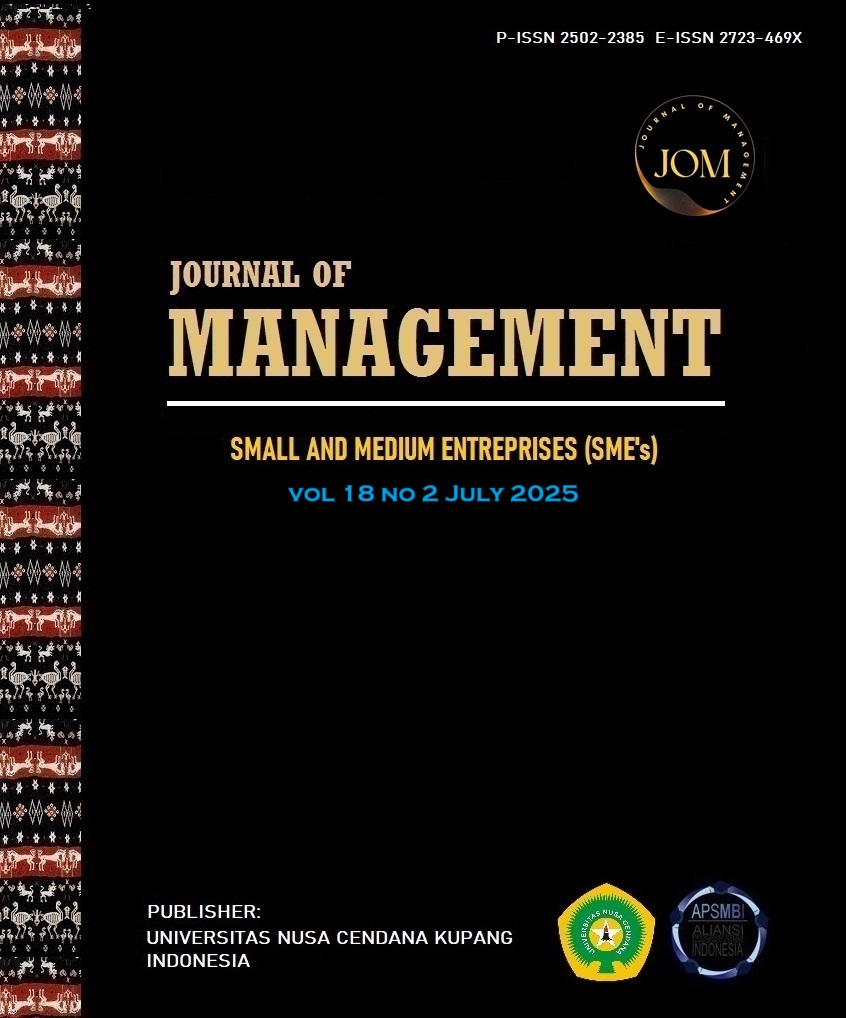EMOTIONAL INTELLIGENCE AND PERFORMANCE : BIBLIOMETRIC ANALYSIS
Abstract
This article uses a systematic literature review, which aims to summarize several studies regarding emotional intelligence and performance. Emotional intelligence is a factor in the performance of every company. This article uses the PRISMA (Preferred Reporting Items for Systematic Reviews and Meta-Analyses) method and bibliometric analysis using VOSviewer software. Data sources were obtained from ScienceDirect, Emerald Insight, and Taylor & Francis for the 2019-2024 period. The results obtained were 144,195 articles; then data reduction was carried out using exclusive and inclusive criteria to obtain 52 journals that were reviewed. Results for variables related to emotional intelligence and performance, job performance, project performance, team performance, self-efficacy, self-awareness, leadership, etc. Overall, the author hopes that this research can be used as learning material and written reflection in future research.
Keywords: Emotional Intelligence; Performance; Prisma; Bibliometric
Downloads
References
Alonazi, W. B. (2020). The impact of emotional intelligence on job performance during covid-19 crisis: A cross-sectional analysis. Psychology Research and Behavior Management, 13, 749–757. https://doi.org/10.2147/PRBM.S263656
Baas, J., Schotten, M., Plume, A., Côté, G., & Karimi, R. (2020). Scopus as a curated, high-quality bibliometric data source for academic research in quantitative science studies. Quantitative Science Studies, 1(1), 377–386.
https://doi.org/10.1162/qss_a_00019
Black, J., Kim, K., Rhee, S., Wang, K., & Sakchutchawan, S. (2019). Self-efficacy and emotional intelligence: Influencing team cohesion to enhance team performance. Team Performance Management, 25(1–2), 100–119.
https://doi.org/10.1108/TPM-01-2018-0005
Bozionelos, N., & Singh, S. K. (2017). The relationship of emotional intelligence with task and contextual performance: More than it meets the linear eye. Personality and Individual Differences, 116, 206–211.
https://doi.org/10.1016/j.paid.2017.04.059
Garza-Reyes, J. A. (2015). Lean and green – a systematic review of the state of the art literature. Journal of Cleaner Production, 102, 18–29.
https://doi.org/10.1016/j.jclepro.2015.04.064
Goleman, D. (2009). Kecerdasan Emosional : Mengapa EI lebih penting daripada IQ. PT. Gramedia Pustaka Utama.
Ingram, A., Peake, W. O., Stewart, W., & Watson, W. (2019). Emotional Intelligence and Venture Performance. Journal of Small Business Management, 57(3), 780–800. https://doi.org/10.1111/jsbm.12333
Jamshed, S., & Majeed, N. (2019). Relationship between team culture and team performance through lens of knowledge sharing and team emotional intelligence. Journal of Knowledge Management, 23(1), 90–109. https://doi.org/10.1108/JKM-04-2018-0265
Karimi, L., Leggat, S. G., Bartram, T., & Rada, J. (2020). The effects of emotional intelligence training on the job performance of Australian aged care workers. Health Care Management Review, 45(1), 41–51.
https://doi.org/10.1097/HMR.0000000000000200
Ludo, W. and Nees, J. E. (2010). A general source-normalized approach to bibliometric research performance assessment. Centre for Science and Technology Studies.
Macht, G. A., Nembhard, D. A., & Leicht, R. M. (2019). Operationalizing emotional intelligence for team performance. International Journal of Industrial Ergonomics, 71, 57–63. https://doi.org/10.1016/j.ergon.2019.02.007
Mayer, J. D., Salovey, P., & Caruso, D. (2000). Models of Emotional Intelligence. In Handbook of Intelligence (pp. 396–420). Cambridge University Press. https://doi.org/10.1017/CBO9780511807947.019
Miao, C., Humphrey, R. H., & Qian, S. (2017). A meta‐analysis of emotional intelligence and work attitudes. Journal of Occupational and Organizational Psychology, 90(2), 177–202. https://doi.org/10.1111/joop.12167
Rejeb, A., Abdollahi, A., Rejeb, K., & Treiblmaier, H. (2022). Drones in agriculture: A review and bibliometric analysis. Computers and Electronics in Agriculture, 198, 107017. https://doi.org/10.1016/j.compag.2022.107017
Salovey, P., & Mayer, J. D. (1990). Emotional Intelligence. Imagination, Cognition and Personality, 9(3), 185–211. https://doi.org/10.2190/DUGG-P24E-52WK-6CDG
Setyaningsih, I., Indarti, N., & Jie, F. (2018). Bibliometric analysis of the term “green manufacturing.” International Journal of Management Concepts and Philosophy, 11(3), 315. https://doi.org/10.1504/IJMCP.2018.093500
Sun, J., Tian, X., & Li, R. (2019). Negative effects and mechanisms of emotional intelligence. Advances in Psychological Science, 27(8), 1451–1459.
https://doi.org/10.3724/SP.J.1042.2019.01451
Tu, C., Guo, J., Hatcher, R. C., & Kaufman, J. C. (2020). The Relationship between Emotional Intelligence and Domain‐Specific and Domain‐General Creativity. The Journal of Creative Behavior, 54(2), 337–349. https://doi.org/10.1002/jocb.369

 Robbi Readi(1*)
Robbi Readi(1*)



